2013年新人教版八年级英语上册1-10单元知识清单
- 格式:doc
- 大小:349.00 KB
- 文档页数:10
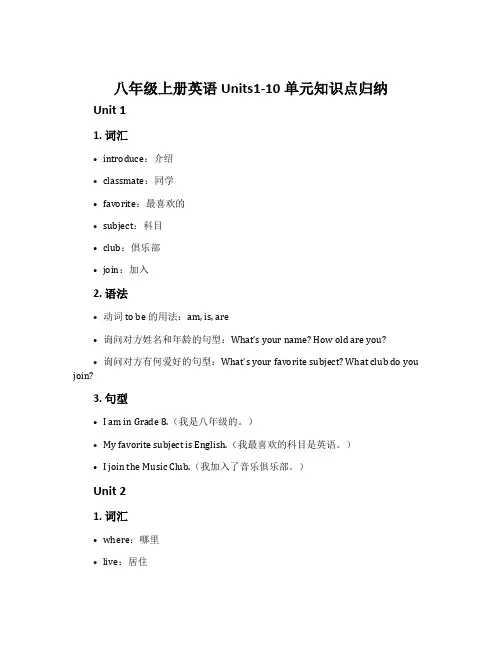
八年级上册英语Units1-10单元知识点归纳Unit 11. 词汇•introduce:介绍•classmate:同学•favorite:最喜欢的•subject:科目•club:俱乐部•join:加入2. 语法•动词 to be 的用法:am, is, are•询问对方姓名和年龄的句型:What’s your name? How old are you?•询问对方有何爱好的句型:What’s your favorite subject? What club do you join?3. 句型•I am in Grade 8.(我是八年级的。
)•My favorite subject is English.(我最喜欢的科目是英语。
)•I join the Music Club.(我加入了音乐俱乐部。
)Unit 21. 词汇•where:哪里•live:居住•city:城市•country:国家•near:靠近•far:远2. 语法•询问对方居住地点的句型:Where do you live? Are you in the city or in the country?•询问对方居住地点是否靠近的句型:Is it near your school?3. 句型•I live in Beijing.(我住在北京。
)•It is in the city.(它在城市里。
)•Yes, it is near my school.(是的,它离我的学校很近。
)Unit 31. 词汇•birthday:生日•when:何时•celebrate:庆祝•presents:礼物•cake:蛋糕2. 语法•询问对方生日的句型:When is your birthday?•询问对方如何庆祝生日的句型:How do you celebrate your birthday?•询问对方生日礼物的句型:What presents do you get?3. 句型•My birthday is on October 10th.(我的生日是十月十日。
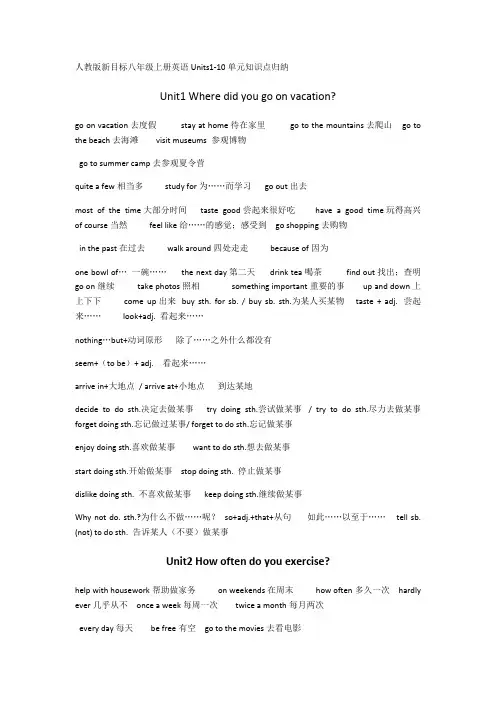
人教版新目标八年级上册英语Units1-10单元知识点归纳Unit1 Where did you go on vacation?go on vacation去度假stay at home待在家里go to the mountains去爬山go to the beach去海滩visit museums 参观博物go to summer camp去参观夏令营quite a few相当多study for为……而学习go out出去most of the time大部分时间taste good尝起来很好吃have a good time玩得高兴of course当然feel like给……的感觉;感受到go shopping去购物in the past在过去walk around四处走走because of因为one bowl of…一碗……the next day第二天drink tea喝茶find out找出;查明go on继续take photos照相something important重要的事up and down上上下下come up出来buy sth. for sb. / buy sb. sth.为某人买某物taste + adj. 尝起来……look+adj. 看起来……nothing…but+动词原形除了……之外什么都没有seem+(to be)+ adj. 看起来……arrive in+大地点/ arrive at+小地点到达某地decide to do sth.决定去做某事try doing sth.尝试做某事/ try to do sth.尽力去做某事forget doing sth.忘记做过某事/ forget to do sth.忘记做某事enjoy doing sth.喜欢做某事want to do sth.想去做某事start doing sth.开始做某事stop doing sth. 停止做某事dislike doing sth. 不喜欢做某事keep doing sth.继续做某事Why not do. sth.?为什么不做……呢?so+adj.+that+从句如此……以至于……tell sb. (not) to do sth. 告诉某人(不要)做某事Unit2 How often do you exercise?help with housework帮助做家务on weekends在周末how often多久一次hardly ever几乎从不once a week每周一次twice a month每月两次every day每天be free有空go to the movies去看电影use the Internet用互联网swing dance摇摆舞play tennis打网球stay up late熬夜;睡得很晚at least至少have dance and piano lessons上舞蹈课和钢琴课go to bed early早点睡觉play sports进行体育活动be good for对……有好处go camping去野营not…at all一点儿也不……in one’s free time在某人的业余时间the most popular最受欢迎的such as比如;诸如old habits die hard积习难改go to the dentist去看牙医morn than多于;超过less than少于help sb. with sth.帮助某人做某事How about…? ......怎么样?/ ……好不好?want sb. to do sth.想让某人做某事How many+可数名词复数+一般疑问句?……有多少……?主语+find+that从句. ……发现……spend time with sb.和某人一起度过时光It’s+ adj.+ to do sth. 做某事的……的。
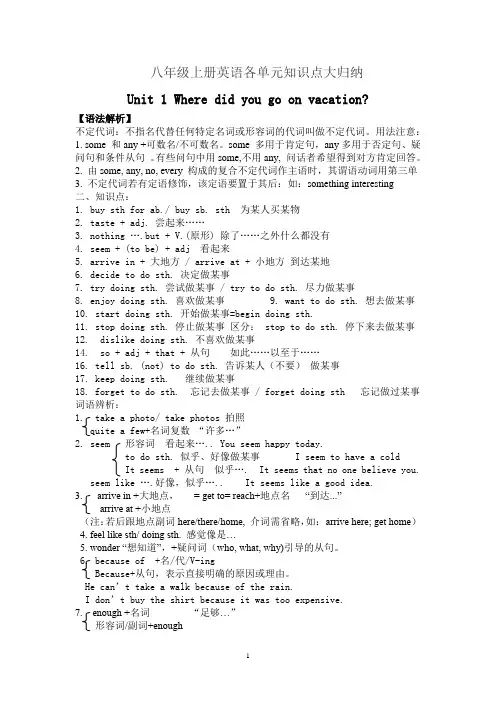
八年级上册英语各单元知识点大归纳Unit 1 Where did you go on vacation?【语法解析】不定代词:不指名代替任何特定名词或形容词的代词叫做不定代词。
用法注意:1. some 和any +可数名/不可数名。
some 多用于肯定句,any多用于否定句、疑问句和条件从句。
有些问句中用some,不用any, 问话者希望得到对方肯定回答。
2. 由some, any, no, every 构成的复合不定代词作主语时,其谓语动词用第三单3. 不定代词若有定语修饰,该定语要置于其后:如:something interesting二、知识点:1. buy sth for ab./ buy sb. sth 为某人买某物2. taste + adj. 尝起来……3. nothing ….but + V.(原形) 除了……之外什么都没有4. seem + (to be) + adj 看起来5. arrive in + 大地方 / arrive at + 小地方到达某地6. decide to do sth. 决定做某事7. try doing sth. 尝试做某事 / try to do sth. 尽力做某事8. enjoy doing sth. 喜欢做某事 9. want to do sth. 想去做某事10. start doing sth. 开始做某事=begin doing sth.11. stop doing sth. 停止做某事区分: stop to do sth. 停下来去做某事12. dislike doing sth. 不喜欢做某事14. so + adj + that + 从句如此……以至于……16. tell sb. (not) to do sth. 告诉某人(不要)做某事17. keep doing sth. 继续做某事18. forget to do sth. 忘记去做某事 / forget doing sth 忘记做过某事词语辨析:1. take a photo/ take photos 拍照quite a few+名词复数“许多…”2. seem 形容词看起来….. You seem happy today.to do sth. 似乎、好像做某事 I seem to have a coldIt seems + 从句似乎…. It seems that no one believe you.seem like ….好像,似乎….. It seems like a good idea.3. arrive in +大地点,= get to= reach+地点名“到达...”arrive at +小地点(注:若后跟地点副词here/there/home, 介词需省略,如:arrive here; get home)4. feel like sth/ doing sth. 感觉像是…5. wonder “想知道”,+疑问词(who, what, why)引导的从句。
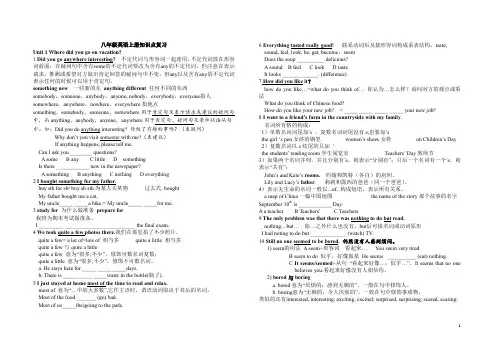
八年级英语上册知识点复习Unit 1 Where did you go on vacation?1 Did you go anywhere interesting? 不定代词与形容词一起连用,不定代词放在形容词前面,在疑问句中含有some的不定代词要改为含有any的不定代词,但注意在表示请求,推测或希望对方做出肯定回答的疑问句中不变。
但any以及含有any的不定代词表示任何的时候可以用于肯定句。
something new 一些新的东anything different任何不同的东西somebody,someone,anybody,anyone, nobody,everybody,everyone指人somewhere,anywhere,nowhere,everywhere指地点something,somebody,someone,somewhere用于肯定句及表示请求或建议的疑问句中,而anything,anybody,anyone,anywhere用于否定句、疑问句及条件状语从句中。
如:Did you do anything interesting? 你做了有趣的事吗?(表疑问)Why don‘t you visit someone with me?(表建议)If anything happens, please tell me.Can I ask you ________ questions?A someB anyC littleD somethingIs there ____________ new in the newspaper?A somethingB anythingC nothingD everything2 I bought something for my father.buy sth for sb/ buy sb sth.为某人买某物过去式: boughtMy father bought me a cat.My uncle_____ _____a bike.= My uncle_____ _____for me.3 study for为什么做准备prepare for我将为期末考试做准备。
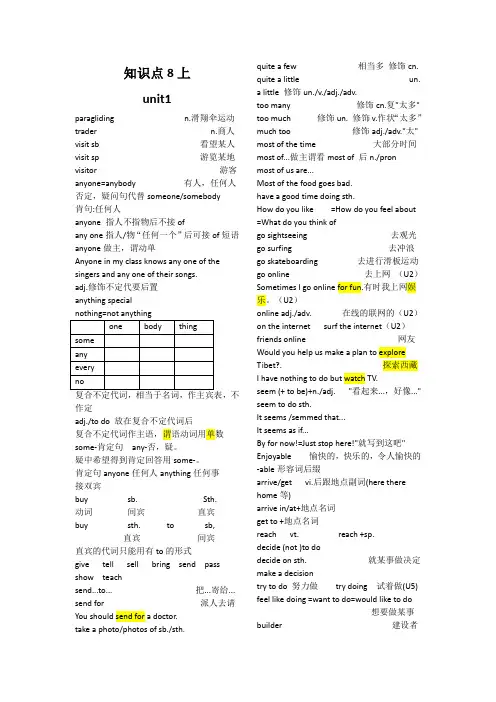
知识点8上unit1paragliding n.滑翔伞运动trader n.商人visit sb 看望某人visit sp 游览某地visitor 游客anyone=anybody 有人,任何人否定,疑问句代替someone/somebody肯句:任何人anyone 指人不指物后不接ofany one指人/物“任何一个”后可接of短语anyone做主,谓动单Anyone in my class knows any one of the singers and any one of their songs.adj.修饰不定代要后置anything special作定adj./to do 放在复合不定代词后复合不定代词作主语,谓语动词用单数some-肯定句any-否,疑。
疑中希望得到肯定回答用some-。
肯定句anyone任何人anything任何事接双宾buy sb. Sth.动词间宾直宾buy sth. to sb,直宾间宾直宾的代词只能用有to的形式give tell sell bring send pass show teachsend...to... 把...寄给... send for 派人去请You should send for a doctor.take a photo/photos of sb./sth. quite a few 相当多修饰cn. quite a little un.a little 修饰un./v./adj./adv.too many 修饰cn.复"太多" too much 修饰un. 修饰v.作状“太多”much too 修饰adj./adv."太" most of the time 大部分时间most of...做主谓看most of 后n./pronmost of us are...Most of the food goes bad.have a good time doing sth.How do you like =How do you feel about =What do you think ofgo sightseeing 去观光go surfing 去冲浪go skateboarding 去进行滑板运动go online 去上网(U2)Sometimes I go online for fun.有时我上网娱乐。
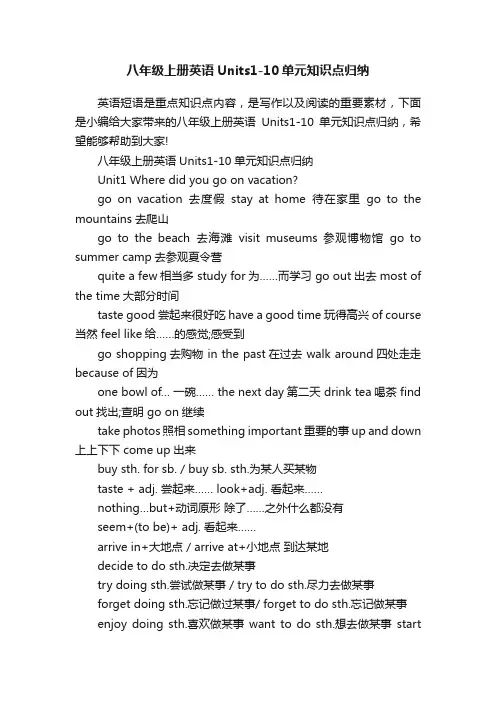
八年级上册英语Units1-10单元知识点归纳英语短语是重点知识点内容,是写作以及阅读的重要素材,下面是小编给大家带来的八年级上册英语Units1-10单元知识点归纳,希望能够帮助到大家!八年级上册英语Units1-10单元知识点归纳Unit1 Where did you go on vacation?go on vacation去度假stay at home待在家里go to the mountains去爬山go to the beach去海滩visit museums 参观博物馆go to summer camp去参观夏令营quite a few相当多 study for为……而学习 go out出去 most of the time大部分时间taste good尝起来很好吃 have a good time玩得高兴 of course 当然 feel like给……的感觉;感受到go shopping去购物 in the past在过去 walk around四处走走because of因为one bowl of… 一碗…… the next day第二天 drink tea喝茶 find out找出;查明 go on继续take photos照相 something important重要的事 up and down 上上下下 come up出来buy sth. for sb. / buy sb. sth.为某人买某物taste + adj. 尝起来…… look+adj. 看起来……nothing…but+动词原形除了……之外什么都没有seem+(to be)+ adj. 看起来……arrive in+大地点 / arrive at+小地点到达某地decide to do sth.决定去做某事try doing sth.尝试做某事 / try to do sth.尽力去做某事forget doing sth.忘记做过某事/ forget to do sth.忘记做某事enjoy doing sth.喜欢做某事want to do sth.想去做某事startdoing sth.开始做某事stop doing sth. 停止做某事dislike doing sth. 不喜欢做某事keep doing sth.继续做某事Why not do. sth.?为什么不做……呢?so+adj.+that+从句如此……以至于……tell sb. (not) to do sth. 告诉某人(不要)做某事Unit2 How often do you exercise?help with housework帮助做家务on weekends在周末how often多久一次 hardly ever几乎从不once a week每周一次 twice a month每月两次 every day每天be free有空go to the movies去看电影use the Internet用互联网swing dance摇摆舞 play tennis打网球stay up late熬夜;睡得很晚 at least至少 have dance and piano lessons上舞蹈课和钢琴课go to bed early早点睡觉play sports进行体育活动be good for对……有好处 go camping去野营not…at all一点儿也不…… in one’s free time在某人的业余时间 the most popular最受欢迎的such as比如;诸如old habits die hard积习难改go to the dentist去看牙医morn than多于;超过 less than少于help sb. with sth.帮助某人做某事How about…? ......怎么样?/ ……好不好?want sb. to do sth.想让某人做某事 How many+可数名词复数+一般疑问句? ……有多少……?主语+find+that从句. ……发现…… spend time with sb.和某人一起度过时光It’s+ adj.+ to do sth. 做某事的……的。
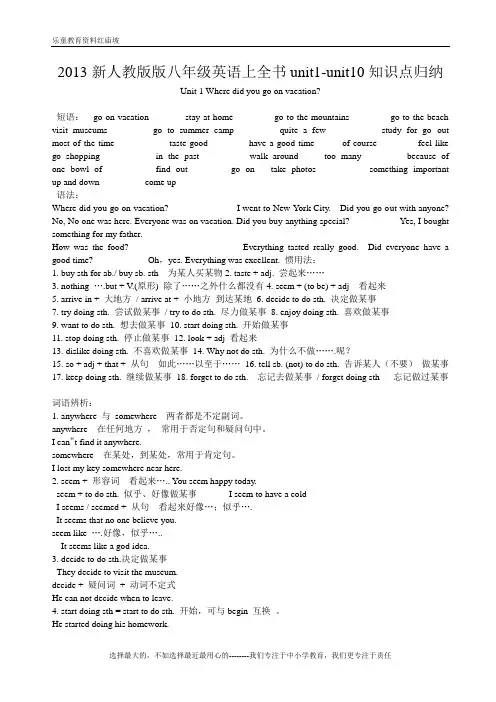
2013新人教版版八年级英语上全书unit1-unit10知识点归纳Unit 1 Where did you go on vacation?短语:go on vacation stay at home go to the mountains go to the beach visit museums go to summer camp quite a few study for go out most of the time taste good have a good time of course feel like go shopping in the past walk around too many because of one bowl of find out go on take photos something important up and down come up语法:Where did you go on vacation? I went to New York City. Did you go out with anyone? No, No one was here. Everyone was on vacation. Did you buy anything special? Yes, I bought something for my father.How was the food? Everything tasted really good. Did everyone have a good time? Oh,yes. Everything was excellent. 惯用法:1. buy sth for ab./ buy sb. sth 为某人买某物2. taste + adj. 尝起来……3. nothing ….but + V.(原形) 除了……之外什么都没有4. seem + (to be) + adj 看起来5. arrive in + 大地方/ arrive at + 小地方到达某地6. decide to do sth. 决定做某事7. try doing sth. 尝试做某事/ try to do sth. 尽力做某事8. enjoy doing sth. 喜欢做某事9. want to do sth. 想去做某事10. start doing sth. 开始做某事11. stop doing sth. 停止做某事12. look + adj 看起来13. dislike doing sth. 不喜欢做某事14. Why not do sth. 为什么不做…….呢?15. so + adj + that + 从句如此……以至于……16. tell sb. (not) to do sth. 告诉某人(不要)做某事17. keep doing sth. 继续做某事18. forget to do sth. 忘记去做某事/ forget doing sth 忘记做过某事词语辨析:1. anywhere 与somewhere 两者都是不定副词。
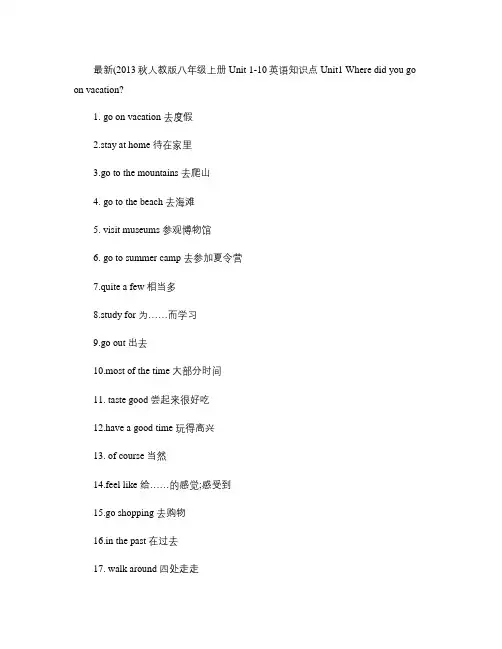
最新(2013秋人教版八年级上册Unit 1-10英语知识点 Unit1 Where did you go on vacation?1. go on vacation 去度假2.stay at home 待在家里3.go to the mountains 去爬山4. go to the beach 去海滩5. visit museums 参观博物馆6. go to summer camp 去参加夏令营7.quite a few 相当多8.study for 为……而学习9.go out 出去10.most of the time 大部分时间11. taste good 尝起来很好吃12.have a good time 玩得高兴13. of course 当然14.feel like 给……的感觉;感受到15.go shopping 去购物16.in the past 在过去17. walk around 四处走走18. because of 因为19. one bowl of…一碗……20. the next day 第二天21. drink tea 喝茶22. find out 找出;查明23. go on 继续24.take photos 照相25. something important 重要的事26. up and down 上上下下27. come up 出来28. buy sth. for sb. / buy sb. sth. 为某人买某物29. taste + adj. 尝起来……30. look+adj. 看起来……31.nothing…but+动词原形除了……之外什么都没有32.seem+(to be+ adj. 看起来……33. arrive in+大地点 / arrive at+小地点到达某地34.decide to do sth. 决定去做某事35. try doing sth. 尝试做某事 /36. try to do sth. 尽力去做某事37. forget doing sth. 忘记做过某事/38. forget to do sth. 忘记做某事39. enjoy doing sth. 喜欢做某事40. want to do sth. 想去做某事41. start doing sth. 开始做某事42. stop doing sth. 停止做某事43. dislike doing sth. 不喜欢做某事44. keep doing sth. 继续做某事45. Why not do. sth.? 为什么不做……呢?46. so+adj.+that+从句如此……以至于……47. tell sb. (not to do sth. 告诉某人(不要做某事Unit2 How often do you exercise?1help with housework 帮助做家务2on weekends 在周末3how often 多久一次4hardly ever 几乎从不5once a week 每周一次6twice a month 每月两次7every day 每天8be free 有空9go to the movies 去看电影10use the Internet 用互联网11swing dance 摇摆舞12play tennis 打网球13stay up late 熬夜;睡得很晚14at least 至少15have dance and piano lessons 上舞蹈课和钢琴课16go to bed early 早点睡觉17play sports 进行体育活动18be good for 对……有好处19go camping 去野营20not…at all 一点儿也不……21in one’s free time 在某人的业余时间22the most popular 最受欢迎的23such as 比如;诸如24old habits die hard 积习难改25go to the dentist 去看牙医26morn than 多于;超过27less than 少于28help sb. with sth. 帮助某人做某事29How about…? ......怎么样?/ ……好不好?30want sb. to do sth. 想让某人做某事31How many+可数名词复数+一般疑问句?……有多少……? 32主语+find+that从句. ……发现……33spend time with sb. 和某人一起度过时光34It’s+ adj.+ to do sth. 做某事的……的。
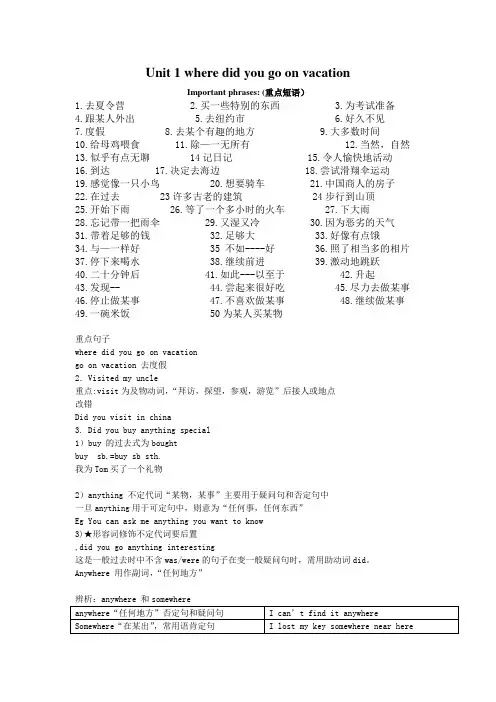
Unit 1 where did you go on vacationImportant phrases: (重点短语)1.去夏令营2.买一些特别的东西3.为考试准备4.跟某人外出5.去纽约市6.好久不见7.度假 8.去某个有趣的地方 9.大多数时间10.给母鸡喂食 11.除—一无所有 12.当然,自然13.似乎有点无聊 14记日记 15.令人愉快地活动16.到达 17.决定去海边 18.尝试滑翔伞运动19.感觉像一只小鸟 20.想要骑车 21.中国商人的房子22.在过去 23许多古老的建筑 24步行到山顶25.开始下雨 26.等了一个多小时的火车 27.下大雨28.忘记带一把雨伞 29.又湿又冷 30.因为恶劣的天气31.带着足够的钱 32.足够大 33.好像有点饿34.与—一样好 35 不如----好 36.照了相当多的相片37.停下来喝水 38.继续前进 39.激动地跳跃40.二十分钟后 41.如此---以至于 42.升起43.发现-- 44.尝起来很好吃 45.尽力去做某事46.停止做某事 47.不喜欢做某事 48.继续做某事49.一碗米饭 50为某人买某物重点句子where did you go on vacationgo on vacation 去度假2.Visited my uncle重点:visit为及物动词,“拜访,探望,参观,游览”后接人或地点改错Did you visit in china3. Did you buy anything special1)buy 的过去式为boughtbuy sb.=buy sb sth.我为Tom买了一个礼物2)anything 不定代词“某物,某事”主要用于疑问句和否定句中一旦anything用于可定句中,则意为“任何事,任何东西”Eg You can ask me anything you want to know3)★形容词修饰不定代词要后置,did you go anything interesting这是一般过去时中不含was/were的句子在变一般疑问句时,需用助动词did。
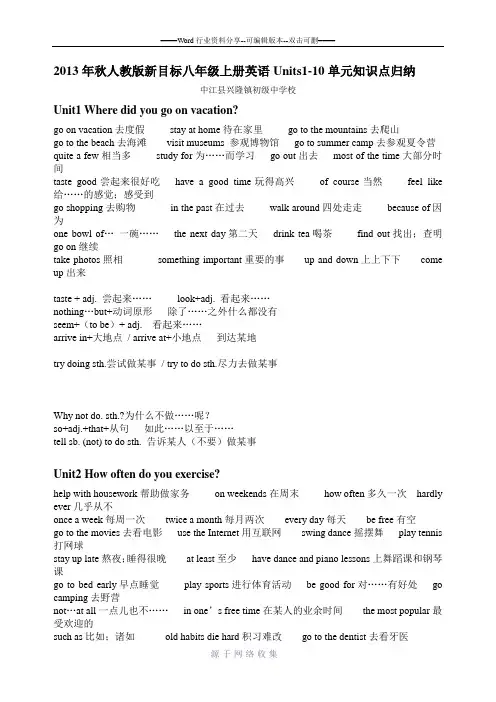
2013年秋人教版新目标八年级上册英语Units1-10单元知识点归纳中江县兴隆镇初级中学校Unit1 Where did you go on vacation?go on vacation去度假stay at home待在家里go to the mountains去爬山go to the beach去海滩visit museums 参观博物馆go to summer camp去参观夏令营quite a few相当多study for为……而学习go out出去most of the time大部分时间taste good尝起来很好吃have a good time玩得高兴of course当然feel like 给……的感觉;感受到go shopping去购物in the past在过去walk around四处走走because of因为one bowl of…一碗……the next day第二天drink tea喝茶find out找出;查明go on继续take photos照相something important重要的事up and down上上下下come up出来taste + adj. 尝起来……look+adj. 看起来……nothing…but+动词原形除了……之外什么都没有seem+(to be)+ adj. 看起来……arrive in+大地点/ arrive at+小地点到达某地try doing sth.尝试做某事/ try to do sth.尽力去做某事Why not do. sth.?为什么不做……呢?so+adj.+that+从句如此……以至于……tell sb. (not) to do sth. 告诉某人(不要)做某事Unit2 How often do you exercise?help with housework帮助做家务on weekends在周末how often多久一次hardly ever几乎从不once a week每周一次twice a month每月两次every day每天be free有空go to the movies去看电影use the Internet用互联网swing dance摇摆舞play tennis 打网球stay up late熬夜;睡得很晚at least至少have dance and piano lessons上舞蹈课和钢琴课go to bed early早点睡觉play sports进行体育活动be good for对……有好处go camping去野营not…at all一点儿也不……in one’s free time在某人的业余时间the most popular最受欢迎的such as比如;诸如old habits die hard积习难改go to the dentist去看牙医morn than多于;超过less than少于help sb. with sth.帮助某人做某事How about…? ......怎么样?/ ……好不好?want sb. to do sth.想让某人做某事How many+可数名词复数+一般疑问句?……有多少……?主语+find+that从句. ……发现……It’s+ adj.+ to do sth. 做某事的……by doing sth. 通过做某事What’s your favorite……?你最喜爱的……是什么?Unit3 I’m more outgoing than my sister.more outgoing更外向as…as…与……一样…… the sing ing competition唱歌比赛be similar to与……相像的/类似的the same as和……相同;与……一致be different from 与……不同care about关心;介意be like a mirror像一面镜子the most important最重要的as long as只要;既然bring out使显现;使表现出get better grades取得更好的成绩reach for伸手取in fact事实上;实际上make friends交朋友the other其他的touch one’s heart感动某人be talented in music有音乐天赋be good at擅长…… be good with善于与……相处have fun doing sth.享受做某事的乐趣be good at doing sth擅长做某事make sb. do sth.让某人做某事want to do sth.想要做某事as+adj./adv.的原级+as 与……一样……It’s+ adj.+for sb. to do sth. 对某人来说,做某事……的。
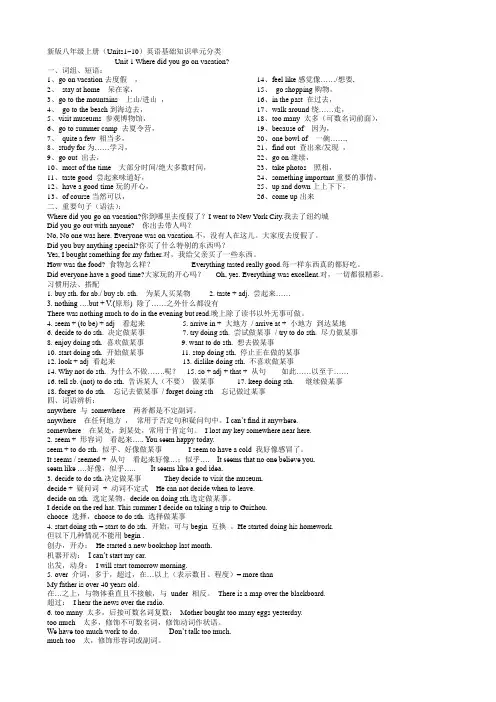
新版八年级上册(Units1~10)英语基础知识单元分类Unit 1 Where did you go on vacation?一、词组、短语:1、go on vacation去度假,2、stay at home 呆在家,3、go to the mountains 上山/进山,4、go to the beach到海边去,5、visit museums 参观博物馆,6、go to summer camp 去夏令营,7、quite a few 相当多,8、study for为……学习,9、go out 出去,10、most of the time 大部分时间/绝大多数时间,11、taste good 尝起来味道好,12、have a good time玩的开心,13、of course当然可以,14、feel like感觉像……/想要,15、go shopping购物,16、in the past 在过去,17、walk around绕……走,18、too many 太多(可数名词前面),19、because of 因为,20、one bowl of 一碗……,21、find out 查出来/发现,22、go on继续,23、take photos 照相,24、something important重要的事情,25、up and down上上下下,26、come up出来二、重要句子(语法):Where did you go on vacation?你到哪里去度假了?I went to New York City.我去了纽约城Did you go out with anyone? 你出去带人吗?No, No one was here. Everyone was on vacation.不,没有人在这儿。
大家度去度假了。
Did you buy anything special?你买了什么特别的东西吗?Yes, I bought something for my father.对,我给父亲买了一些东西。
一单元知识清单一、重点词汇变形1.foot--feet2.tooth--teeth3.lie-lying---lied--lied 说谎lie--lay--lain 躺下lay--laid--laid放置,下蛋4.break--broken5.hurt--hurt--hurt6.hit--hit--hit7.fall--fell8.blood--bleed9.climb--climber 10.breathe--breath 11.run--ran 奔跑,经营,流淌,行驶,操作12.decide--decision 13.important--importance 14.die--dead--dying--death二、重点搭配1.表示身体疾病:①have a/an+疾病名称;have a headache have a sore throat②hurt/cut/break+具体部位;hurt my leg, cut her finger, break him arm③have a pain in/on+具体部位; have a pain in/on my head2.too much+不可数much too+形/副too many+可复3.have a cold 感冒have a fever 发烧4.lie down 躺下5.get an X-ray 拍X光片6.take one’s temperature 量体温7.put some medicine on 在...上面敷药take some medicine 吃药(中药)take some pills 西药,药片10.take a break/take breaks 休息一下11.think twice 认真思考12.get off 下车get on 上车13.to one’s surprise 令某人惊讶的是14.thanks to 多亏,幸亏15.in time 及时on time 准时16.get into trouble 陷入困境have trouble/difficulties/problems (in) doing sth. 在做.....有困难/问题17.right away=at once=right now=immediately 立刻/马上18.fall down 摔倒fall asleep 入睡fall behind 落后18.sick/ill : sick 可作表语和定语be/feel sick ill只做表语,(其比较级,最高级为:worse worst)19.as a climber 作为一名登山者(介词)as you can see 正如你所见(介词)as it rains 由于在下雨(连词)as you go home 当你回家时(连词)ed to do 过去习惯做某事be/get used to doing 现在习惯做某事be used to do 被用来做某事21.take risks 冒险22. 物+run out 人+run out of+物用完,耗尽23.cut off 切除cut down 砍倒,削减24.be in control of 掌管,管理25.get out of 脱离,离开26.the importance of ...的重要性27.give up doing sth. 放弃做某事三、语法知识1.“(你)怎么了?”各种常见表达:What’s the matter (with you)?=What’s the trouble (with you)?=What’s the problem (with you)?=What’ s wrong (with you)?=What’s up?=What happened?①作及物动词(短语)的宾语,常用于teach, hurt, enjoy, dress, buy, help, look after, take care of 等后面。
各单元知识点归纳(全册)Units1-10新人教版八年级上册英语 Unit1 Where did you go on vacation? 待在家里stay at home 去度假go on vacation 去海滩go to the beach 去爬山go to the mountainsgo to summer camp 参观博物馆visit museums 去参观夏令营为……而学习study for 相当多quite a few 大部分时间most of the time 出去go out 尝起来很好吃taste good +v.ing 玩得高兴have a good time=have funof course 给……的感觉;感受到feel like 当然四处走走walk around 在过去in the past 去购物go shopping …一碗……one bowl of 因为because of 第二天the next day 继续go on 找出;查明find out 喝茶drink tea 重要的事something important 照相take photoscome u 上上下下up and down 出来p 为某人买某物buy sth. for sb. / buy sb. sth. 看起来……look+adj. 尝起来……taste + adj. 动词原形除了……之外什么都没有but+…nothing 看起来…… + adj. )to be(seem+ 小地点到达某地/ arrive at+ 大地点arrive in+ 决定去做某事decide to do sth. 尽力去做某事/ try to do sth. 尝试做某事try doing sth. 忘记做某事/ forget to do sth.忘记做过某事forget doing sth. 想去做某事want to do sth. 喜欢做某事enjoydoing sth. 开始做某事start doing sth. 停止做某事stop doing sth. 继续做某事keep doing sth. 不喜欢做某事dislike doing sth. 状态…保持…使keep sth+adj. 为什么不做……呢?Why not +v.?=Why don’t you+v.? 句如此……以至于……从so+adj.+that+告诉某人(不要)做某事tell sb. (not) to do sth. …想要做…想要feel like +n./v.ing sth 单元强化练习:一、根据句意,用所给单词的适当形式填空。
Unit 1:一、 Grammar1.Be 动词的过去式:必定句: I/He/she/it was(not)You/we/they were ...一般疑问句将 was, were 放在句首2.动词过去式:必定句:主语+V过去式+其余I watched cartoons.She visited the zoo.一般疑问句: Did+ 主语 +V 原形 +其余Did you read book last night? Yes, I did. No, I didn't.Did she clean the desk just now? Yes, she did. No, she didn't.否认句:主语 +didn ’t+V原形 +其余They didn't go the the part yesterday.He didn't make model ships last week3.复合不定代词1)、 Anyone、anybody 用于否认句、疑问句中:某人用于必定句中:任何人Anything用于否认句、疑问句中:某事或某东西用于必定句中:任何事情或任何东西备注:在句中能够做表语、主语和宾语,但不行做定语。
2)、复合不定代词受形容词修饰时,形容词放不定代词后边。
Anything special /something interesting3)、含 some- 和 any-的复合不定代词的差别:Any- 表示“某事、某人、某地”,一般用于疑问句否认句;但表示“任何事,任何人”,可用于必定句;Some-表示“某事、某人、某地”,一般用于必定句;但是希望获取对方必定回答时,能够用于一般疑问句中。
I met someone interesting yesterday. / Would you like something to eat.4)、由 some、 any、every、no 构成的复合不定代词做主语时,都看做单数,谓语动词采纳第三人称单数形式。
2013年新人教版八年级英语上册1-10单元知识清单Unit 1 Where did you go to vacation? 知识清单语言目标淡论过去的事情词汇SECTION A 名词:hen(母鸡),pig(猪),diary(日记;记事簿)代词:anyone(任何人),something(某事;某物),nothing(没有什么;没有一件东西),everyone(每人;人人;所有人),myself(我自己;我本人),yourself(你自己;您自己),someone(某人)动词:seem(好像;似乎;看来)形容词:wonderful(精彩的;绝妙的),bored(厌倦的;烦闷的)副词:anywhere(在任何地方)兼类词:few adj.& pron.(不多;很少),most adj.,adv. & pron.(最多;大多数)SECTION B 名词:activity(活动),paragliding(滑翔伞运动),bird(鸟),bicycle(自行车;脚踏车),building(建筑物;房子),trader(商人),difference(差别;差异),top(顶部;表面),umbrella(伞;雨伞),hill(小山;山丘),duck(鸭)动词:decide(决定;选定),wonder(想知道;琢磨)形容词:wet(湿的;潮湿的;下雨的),hungry(饥饿的)副词:as(像……一样;如同)兼类词:try v.& n.(尝试;设法;努力),wait v.& n.(等待;等候),below prep.& adv.(在……下面;到……下面),enough adj.& adv.【足够的(地);充足的(地);充分的(地)】,dislike v.& n.【不喜爱(的事物);厌恶(的事物)】短语SECTION A on vacation(度假),stay at home(待在家里),go to New York City(去纽约市),visit my uncle(拜访我的叔叔),go to summer camp(去参加夏令营),go to the mountain(去山区),go to the beach(去海滩),visit museums(参观博物馆),quite a few(相当多;不少),buy…for…(为……买……),of course(当然;自然),keep a diary(写日记)SECTION B arrive in(到达),feel like(给……的感觉;感受到),in the past(在过去),enjoy doing sth.(喜欢做某事),too many(太多),because of(因为), taste great (品尝起来好极了), the top of the hill(山顶)SELF CHECK bring back(带回来),so…that…(如此……以至于……),up and down(上上下下),come up(升起)交际用语1.- Where did you go on vacation?你去哪里度假了?-I went to the mountains.我去山区了。
2.Long time no see.很久没见了。
3.Everything tasted really good. -切品尝起来真的很好。
4. I felt like l was a bird.我感觉我成了一只鸟。
5.What a difference a day makes!多么与众不同的一天!语法一般过去时Unit 2 How often do you exercise? 知识清单语言目标谈论你做事情的频率词汇SECTION A 名词:housework(家务劳动;家务事),Internet【(国际)互联网;因特网】,program(节目)形容词:full(忙的;满的;充满的)副词:hardly(几乎不;几乎没有),ever(在任何时候;从来;曾经),once(一次;曾经),twice(两次;两倍),maybe(大概;或许;可能)兼类词:swing n.(摆动;秋千)v.【(使)摆动;摇摆】,least adv.(最小;最少)adj.& pron.(最小的;最少的)SECTION B 名词:junk(无用的东西;无价值的东西),coffee(咖啡),health【健康;人的身体(或精神)状态】,result(结果;后果),percent(百分之……),television(电视节目;电视机),mind(头脑;心智),body(身体),writer(作者;作家),dentist(牙科医生),magazine(杂志;期刊),point(得分;点)动词:die(消失;灭亡;死亡)副词:together(在一起;共同),however(然而;不过),almost(几乎;差不多)介词:through(以;凭借;穿过),none(没有一个;毫无)连词:although(虽然;尽管;即使)兼类词:online adj.& adv.【在线(的);联网(的)】,such adj.& pron.(这样的;那样的;类似的),than prep.& conj.【(用于引出比较的第二部分)比】,less adv.(较少;较小)adj.&pron.(较少的;更少的)短语SECTION A how often(多久一次),on weekends(在周末),help with housework (帮忙做家务),hardly ever(几乎从不),every day(每一天),once a week(一周一次),use the Internet(使用互联网),swing dance(摇摆舞),have class(上课),stay up(熬夜),eat a healthy breakfast(吃健康的早餐),at least(至少;不少于;起码)SECTION B junk food(垃圾食品),be good for…(对…有益),how many (多少),fifteen percent of…(…的百分之十五),four to six times a week(一周四到六次),go online(上网),such as(例如;像…一样),start exercising(开始锻炼),go to the dentist(去看牙医),a 16-year-old high school student(一位16岁的高中生),more than(多于),teeth cleaning(牙齿清洁),less than(少于)SELF CHECK go to the shopping center(去购物中心)交际用语1.How often do you watch TV?你多久看一次电视?2.What do you usually do on weekends?你通常在周末做什么?3.Does Sue eat a healthy breakfast?休吃健康的早餐吗?4.She says it's good for my health.她说那对我的健康有益。
5.He plays at least twice a week.他一周至少踢两次。
6.Here are the results.这是结果。
7.Forty-five percent exercise four to six times a week.百分之四十五的(学生)一周锻炼四到六次。
8.Although many students like to watch sports, game shows are the most popular. 虽然许多学生喜欢看体育,但是游戏节目是最受欢迎的。
9. It is good to relax by using the Internet or watching game shows.通过使用互联网或看游戏节目来放松是好的。
语法一般现在时Unit 3 I’m more outgoing than my sister.知识清单语言目标谈论个性特征;对人物进行比较词汇SECTION A名词:competition(比赛;竞赛;竞争)动词:win(获胜;赢;赢得)形容词:outgoing(爱交际的;友好的;外向的),hard-working(工作努力的;辛勤的),fantastic(极好的;了不起的)副词:loudly(喧闹地;大声地;响亮地),quietly(轻声地;轻柔地;安静地),clearly(清楚地;清晰地;明白地)兼类词:better adj.& adv.[较好的(地);更好的(地),which pron.& adj.(哪一个;哪一些),though adv.(不过;可是;然而)conj.(虽然;尽管;不过)SECTION B名词:mirror(镜子),kid(小孩;年轻人), grade(成绩等级;评分等级),saying(谚语;格言;警句),hand(手),heart(内心;心脏),fact(现实;事实),arm(手臂;上肢),information(信息;消息)动词:care(在意;担忧;关心),should(应该;应当;可以),reach(伸手;到达;抵达),touch(感动;触摸),break[(使)破;裂;碎;损坏],share(分享;共享;共用;分摊)形容词:talented(有才能的;有才干的),serious(严肃的;稳重的),necessary(必需的;必要的),loud(响亮的;大声的),similar(相像的;类似的),primary(最初的;最早的)副词:truly(真正;确实)兼类词:both adj.&pron.(两个;两个都),laugh口.(笑;发笑)n.(笑声)短语SECTION A both…and…(两者都),the singing competition(歌唱比赛),have fun(玩得高兴)SECTION Bthe same ...as…(和…相同;care about(关心;在意),as long与……一致),be good at(擅长)as(只要;既然),be different from(与…不同;与…有差异),bring out(使显现;使表现出),the same as(和……相同;与……一致),in fact(确切地说;事实上;实际上),be similar to(与……相像的;类似的),primary school(小学)SELF CHECK a lot more outgoing(外向得多)交际用语1.Sam has longer hair than Tom.萨姆的头发比汤姆的头发长。